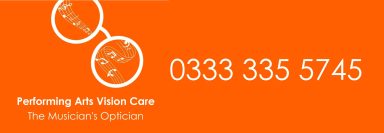
If you are a wind instrumentalist, take time to read this blog and protect your vision.
13/1/2025
Playing a wind instrument could increase your risk of developing glaucoma.
Glaucoma is a major concern for performers, especially those who play high-resistance wind instruments, at Performing Arts Vision Care. These instruments increase glaucoma risk, according to research. When blowing into high-resistance wind instruments, the musician inhales, but before sound production begins, the tongue elevates and secures itself, increasing oral air pressure. Pressure causes abdominal muscle constriction and diaphragmatic contraction, which oppose antagonistic muscle groups and raise intraocular pressure. IOP is eye fluid pressure. It helps identify glaucoma risk.
Understanding raised IOPs and their implications is critical for musicians. In 2000, JS Schuman demonstrated that playing notes with high resistance and volume significantly increases ocular pressure. When wind players with high or low resistance perform, their IOP temporarily increases. However, those using high-resistance instruments experience a greater increase than those using low-resistance instruments.
A 2011 study by ophthalmologist Gunnar Schmidtmann found that transitory and sometimes significant fluctuations in intraocular pressure (IOP), combined with daily instrument play, increase the risk of glaucoma in professional wind instrument players. Therefore, he suggested monitoring these musicians for signs of glaucoma, especially those with additional risk factors.
What are the risks of glaucoma?
Glaucoma can have serious consequences for performing artists; musicians who consistently experience these spikes may be at a higher risk of visual field loss or peripheral vision impairment in the long run. Schuman's findings suggest that repeated intermittent increases in IOP during performances may cause glaucomatous damage, which is frequently mistaken for normal-tension glaucoma.
While it is reassuring that IOP usually returns to normal after musicians stop playing, transient episodes of increased ocular strain should not be overlooked. The prevalence of glaucoma among high-resistance wind instrument players is uncertain as research continues. However, musicians with multiple risk factors, such as myopia or a family history of glaucoma, should exercise extra caution.
Professionals with predispositions to this condition, such as trumpet players, must understand these risks in order to protect their eye health while pursuing their musical passion.
Glaucoma, also known as the "silent thief of sight," is a major threat to wind instrumentalists, whose careers rely heavily on visual acuity. At Performing Arts Vision Care, we are all too familiar with the severity of this condition and advocate for empowerment through education to combat its effects. Understanding who is predisposed to glaucoma is critical for identifying those at risk and implementing preventative measures.
Who is at risk?
Certain medical conditions increase the risk of developing glaucoma. People with a family history of this disease are especially vulnerable. Furthermore, Afro-Caribbeans have a fourfold higher risk than Caucasians. People with myopia (needing glasses for distance vision) and hyperopia (needing glasses for near tasks) are more likely to develop various types of glaucoma. Diabetics, people who have had eye injuries, or those who have been on long-term steroids are all at risk.
Glaucoma is insidious because it can damage the optic nerve without causing immediate symptoms, resulting in peripheral blind spots that can seriously impair an instrumentalist's ability to read music. The deterioration is caused by increased eye pressure or a compromised blood supply, which results in an enlarged optic nerve cup.
Protect your sight reading ability
To protect your sight reading skills and extend your musical career, adopt these preventative habits:
- Have regular eye exams every two years, or annually if you have a family history of glaucoma.
- Maintain a diet high in leafy greens and fruits.
- Engage in regular, moderate exercise.
Maintain a healthy weight.
- Drink less coffee and more tea.
- Avoid smoking.
By taking these proactive steps, wind instrumentalists can protect their vision from glaucoma's sneaky progression and keep their passion for music unaffected by visual impairment. Empowerment through knowledge and action is essential—without clear sight reading abilities, even the most talented musicians cannot perform to their full potential.
What happens when glaucoma strikes?
The signs and symptoms of glaucoma.
Glaucoma usually progresses slowly and does not cause obvious symptoms until it is significantly advanced and optic nerve damage has occurred.
When glaucoma presents symptoms, they may include:
Individuals with the most common types of glaucoma do not exhibit symptoms until late in the disease's progression, when significant optic nerve damage has occurred, resulting in blind spots and vision impairment. A gradual onset of blurred and reduced vision, first affecting peripheral vision, can impair sight reading, especially when sharing a stand.
Observing rings and iridescent circles that surround light sources. Stage lighting can cause glare, making it difficult to perform on stage. Stand lights can produce halos, which can interfere with sight reading and impair performance.
Autocues and teleprompters can be difficult to use because they are frequently placed on the performers' or presenters' periphery, allowing them to interact with the audience. This means that text falls into the performers' blind spots or areas of reduced clarity, resulting in moments of indecision.
Acute angle-closure glaucoma symptoms include severe ocular discomfort and visual distortion. It may be associated with ocular redness and pain in the surrounding area, as well as headache, nausea, and vomiting.
Is glaucoma curable?
Glaucoma is incurable, and lost vision cannot be regained. Nonetheless, by using prisms and filters, we can improve remaining vision, and further vision deterioration can be mitigated or even prevented with pharmacological intervention or surgical procedures. Every glaucoma patient requires ongoing care for best results.
Are you concerned about glaucoma affecting your performance?
If you are concerned that you may be at risk of developing glaucoma or that glaucoma may be affecting your performance, call us at 0333 33 55 745.
.
©Copyright. All rights reserved.
We need your consent to load the translations
We use a third-party service to translate the website content that may collect data about your activity. Please review the details in the privacy policy and accept the service to view the translations.
